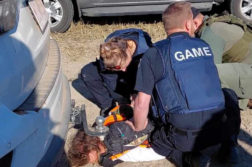Recent photos of Nicole Kidman and Keith Urban show the couple smiling at the cameras, having just shared the news that they, the social or commissioning parents, have a secretly conceived new daughter Faith, thanks to the implanted pregnancy of a gestational carrier.
In the many attempts to make ethical sense of this news, public response has ranged from condemnation of "unnatural" practices, to a celebration of reproductive freedom of choice. We struggle — I know I do — for a way to make sense of what surrogacy relationships mean for adults and for children. In the bird world of course, things are more straightforward. Nicole and Keith would be cuckoos, brood parasites, who lay their eggs in another’s nest, for another bird to sit on.
This is the ideal of the "new" or "created" family. It is so seductive, the belief that we can break from the past; that nothing that comes before us matters, we can smooth over history. There is no need to face loss or disappointment. We can create the family we desire. We can start again. And what better start than a fresh new baby?
The problem with fresh starts is that they are never fresh. Instead, when we try to disconnect from all the component parts of our lives, a blank space of emptiness is created, as if each new family incarnation is a renovation. Let’s forget that old wallpaper ever existed.
What right do we have as prospective parents to forge this separation? To arrange the birth of children who are created in order to be separated from their birth mothers?
There are reasonably large studies into the experience of surrogacy for relinquishing mothers, but no truly large scale follow ups into the experiences of the children born of these women. Largely unspoken is the question of potential harm to children, those born of surrogacy arrangements, and those siblings who remain with the relinquishing mothers.
Current research into the ideal parental and family configuration for children is largely inconclusive. There is understandable debate about research methods and findings, in an area fraught with cultural bias and methodological complexity. This is in part because we have been asking very adult focused questions. What is the best family arrangement for children? How do children fare with same sex parents?
These are our grown up questions, meant to help us make difficult decisions or to comfort us after those decisions have already been made. Children’s questions are often more relationally focused. Less about who each person is, man or woman, gay or not, and more about continuity and connectedness. Do my people love and care for me and for each other? Is everyone who helped to bring me here committed to me and to each other?
How is it that so many of us believe we have a right to have children? Over the past 30 years, while we have often asked questions about what can we do about infertility, we have largely failed to ask what it is we are doing and why. I don’t believe that an overview of the experiences of surrogacy and other forms of assisted reproduction tells us anything much about ideal parental gender, sexual orientation or family structure — although for the most part, research findings have been used to argue issues in these arenas. Instead of open exploration, even research of the highest integrity has been hijacked in a continual re-zoning of human reproduction in order to cater to individual desire.
If we ask what we are doing and why, we must face the possibility that we are trying to mend an unmendable past, or to create a disconnected future. If we focus further research on the needs of children, we may find that what is important in the creation of children has little to do with genetics, gender, sexual orientation, "natural" or "unnatural" practices — and everything to do with real connectedness to people, to place and to history. In other words, maybe what we need are not simply open transparent practices, but ongoing, truthful, loving and committed relationships with everyone involved in the creation of each child. This is far more radical than the simple proposal that a family is whoever we choose it to be. And of course far more difficult to achieve.
I spent most of my early sexually active years desperately trying to avoid pregnancy, and then, once I decided to have a child, she came as soon as the door was opened. I remember being at a party at the time, and telling someone that I planned to become pregnant that month. I look back in amazement at my stupid certainty, my incredible sense of entitlement, particularly as so many women around me in the years following struggled and failed to become pregnant. I am a stranger to infertility, but because of those women, I am not a stranger to the terrible loss and disconnection of infertility.
Neither am I a stranger to assisted reproduction. My daughter has an older half brother conceived by donor insemination using her father’s sperm. This has been both an incredible unfolding of life and a painful fragmentation of unexpected and often unsupported connection. She loves her brother and his mother, wants him to love her too, and wants a currently unattainable family commitment and connection. When we wanted to help ease the pain of childlessness, we made the mistake that many make; we didn’t see — or we glossed over — the potential for loss and disconnection.
As Faith Margaret Kidman Urban grows up, she will be a part of a growing number of children born of women who do not become their parents. On every site with information or research on surrogacy, there are ads for cheap surrogates, particularly in India, which has begun to significantly increase the popularity of this age old practice. If we can bear to ask ourselves what we are doing and why we are doing it, we may find not only that some experiences are not our due, but that it becomes unthinkable to ever call a woman who bears a child a gestational carrier ever again.
Donate To New Matilda
New Matilda is a small, independent media outlet. We survive through reader contributions, and never losing a lawsuit. If you got something from this article, giving something back helps us to continue speaking truth to power. Every little bit counts.



